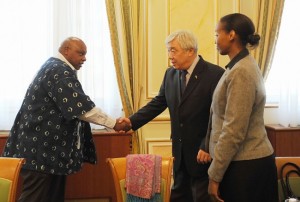ASTANA – Kazakhstan has made “admirable progress” since independence, UN Special Rapporteur on Freedoms of Peaceful Assembly and Association Maina Kiai said in a Jan. 27 statement summing up his visit to the country, and its diverse population lives in relative harmony thanks in no small part to government efforts to promote cohesion and stability. However, maintaining stability must not become an impediment to people enjoying fully the rights to freedom of peaceful assembly and association, he warned.
“The robust exercise of human rights and the maintenance of peace and harmony are mutually reinforcing goals. Indeed, the best guarantor of stability is ensuring that all people living in Kazakhstan fully enjoy their rights as endorsed by the government through its voluntary ratification of international human rights law,” Kiai, who comes from Kenya, said.
The expert’s Jan. 19-27 visit aimed to assess the enjoyment of rights to freedom of peaceful assembly and association in the country, with a final report of his visit to be presented at the June session of the UN Human Rights Council.
In his statement, Kiai noted that the freedoms to peacefully assemble and associate are guaranteed by Kazakhstan’s constitution, but various laws and authorisation procedures required to enjoy those rights can limit their full expression.
Kiai visited Kazakhstan at the standing invitation of the country’s authorities, an invitation which he praised: “The government of Kazakhstan has standing invitations to Special Rapporteurs and I appreciate that it readily agreed to dates for this visit. This is a positive step that I take as expressive of the government’s willingness to engage in a constructive dialogue on the rights to freedom of peaceful assembly and of association, among other human rights.”
Kiai travelled to Astana, Almaty, Aktau and Zhanaozen, where he met with representatives from the government, the judiciary and civil society organisations, including representatives of the opposition groups.
On Jan. 26, Kazakh Foreign Minister Erlan Idrissov met with Kiai. During the meeting, the parties noted the review on the right to freedom of peaceful assembly and freedom of association that Kazakhstan had presented to the special rapporteur, which set out the current situation in Kazakhstan in this field. Idrissov noted that Kazakhstan had been elected vice president of the bureau of the UN Council on Human Rights for 2015, and remained focused on further constructive cooperation with all international organisations and human rights institutions.
Kazakhstan has ratified most human rights pacts, and the government recently decided to develop a draft law on amendments to some legislative acts on safety during mass sports, cultural, entertainment and other events. The country also sends periodic reports to Geneva on the implementation of human rights conventions. Last year, Kazakhstan carried out four successful defences in the UN Human Rights Council and the Universal Periodic Review (UPR) on three conventions: racial discrimination, women’s rights and torture.
During his meeting with Deputy Chairman and head of the Secretariat of the Assembly of the People of Kazakhstan (APK) Yeraly Tugzhanov, Kiai discussed Kazakhstan’s model of interethnic tolerance and social accord.
While in Astana, Kiai also met with Deputy Minister of Justice Elvira Azimova as well as officials at the Ministry of Foreign Affairs. The meeting participants discussed a broad range of issues relating to the legislation of Kazakhstan on the right to freedom of peaceful assembly and association.
During talks with Kazakhstan’s Human Rights Commissioner (Ombudsman) Askar Shakirov, Kiai was briefed on the major directions of development of the national human rights institution and its role and place in the state and legal system of the country. Shakirov also discussed law and legal practice in the field of human rights, including regulatory issues of peaceful assembly and association.
As the expert’s visit took place after the latest assessment of the situation of human rights in Kazakhstan through the Universal Periodic Review (UPR) process, which involves an evaluation of the human rights records of all UN Member States, Shakirov and Kiai exchanged their views on measures to implement the recommendations of the review and other UN mechanisms.
“This represents a good opportunity to follow up in a broader context the recommendations made during the UPR and other UN human rights mechanisms,” Kiai noted.
As part of his visit to Astana, Kiai also met with Chair of the Constitutional Council Igor Rogov, who told the UN Special Rapporteur about the role of the Constitutional Council in ensuring the supremacy of the Constitution and the importance of the decisions of the Constitutional Council in safeguarding the legitimate rights and freedoms guaranteed by the Constitution and in the development of the legal system of Kazakhstan. At that meeting, Kiai gave a positive assessment of Kazakhstan’s commitment to universal values and respect for core international human rights instruments.
In his statement, Kiai thanked the government of Kazakhstan for its cooperation before, during and after his mission. Kiai’s visit was the first information-gathering mission to Kazakhstan by an independent expert tasked by the United Nations Human Rights Council to monitor and promote the rights to freedom of peaceful assembly and association worldwide.


